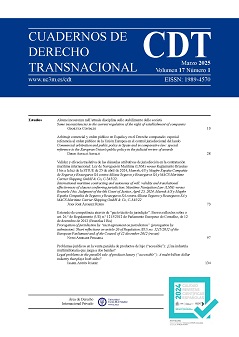Neuroderechos
relevancia jurídica y regulación a través de Derecho comparado
DOI:
https://doi.org/10.20318/cdt.2025.9346Palabras clave:
Neurotecnología, inteligencia artificial, derechos humanos, neuroderechosResumen
La neurotecnología ha avanzado hasta tal punto que ya es posible conocer los pensamientos e incluso interferir en el proceso cognitivo y en la conducta de las personas. Esto plantea una serie de cuestiones vinculadas a la ética y a la filosofía del Derecho en el marco de los derechos humanos. Es en este contexto donde nacen los neuroderechos, cuya propuesta pretende dar respuesta a la incipiente necesidad de otorgar protección jurídica al subconsciente de la mente humana. El presente artículo profundiza en estas cuestiones éticas y filosóficas, estudia las diferentes propuestas actuales de los neuroderechos y ofrece un análisis de su regulación a través del Derecho comparado, con el fin de extraer conclusiones acerca de su relevancia jurídica.
